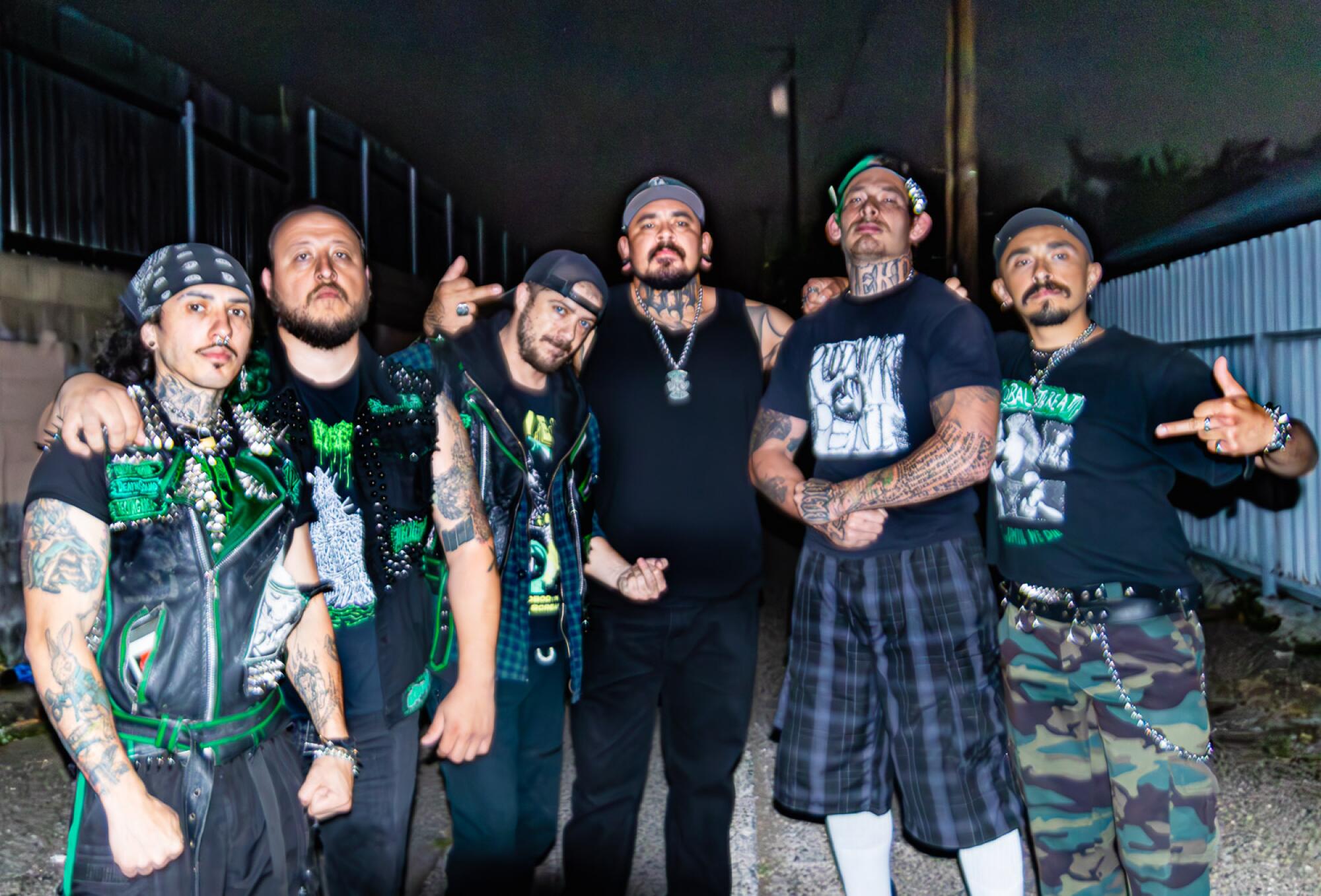The KnuckleHeadz may just be the thing to save America’s youth. They’re categorized too neatly as a punk band from Whittier, but they’re actually a movement: Southern California’s most raucous self-help program and hardcore band. The members are built like dockworkers and dressed like a deleted scene from “The Warriors”: black-and-green leather vests with a spiky-haired skull back patch. They are also the driving force behind the Punk Rock Fight Club, a Southern California-based organization dedicated to improving young men’s lives through fitness and structure. The rules are as strict as they are simple, and in this topsy-turvy world, truly radical: no hard drugs, no crime, no racists, no abusers. Respect yourself, your brothers and your community.
The KnuckleHeadz achieved a moment of internet fame after hosting a completely unsanctioned show in an unsuspecting McDonald’s for a hundred people. The viral clip of the show is the convenient entry point, but it sells short what the gentlemen have built. Onstage, the KnuckleHeadz are all sweat and spectacle: profanity-laced breakdowns, fans crowd surfing on boogie boards riding a human tide, and the green-and-black army in the pit pulling strangers upright. The absurdity of a fast-food slam pit, bodies and burgers briefly airborne — suggests anarchy. Look closer and you see choreography: Men catching falls, clearing space and enforcing a code. Punk has always promised salvation by noise. The KnuckleHeadz add a footnote: Salvation requires reps, rules and someone mean enough to care. Offstage, they run an infrastructure for staying alive.
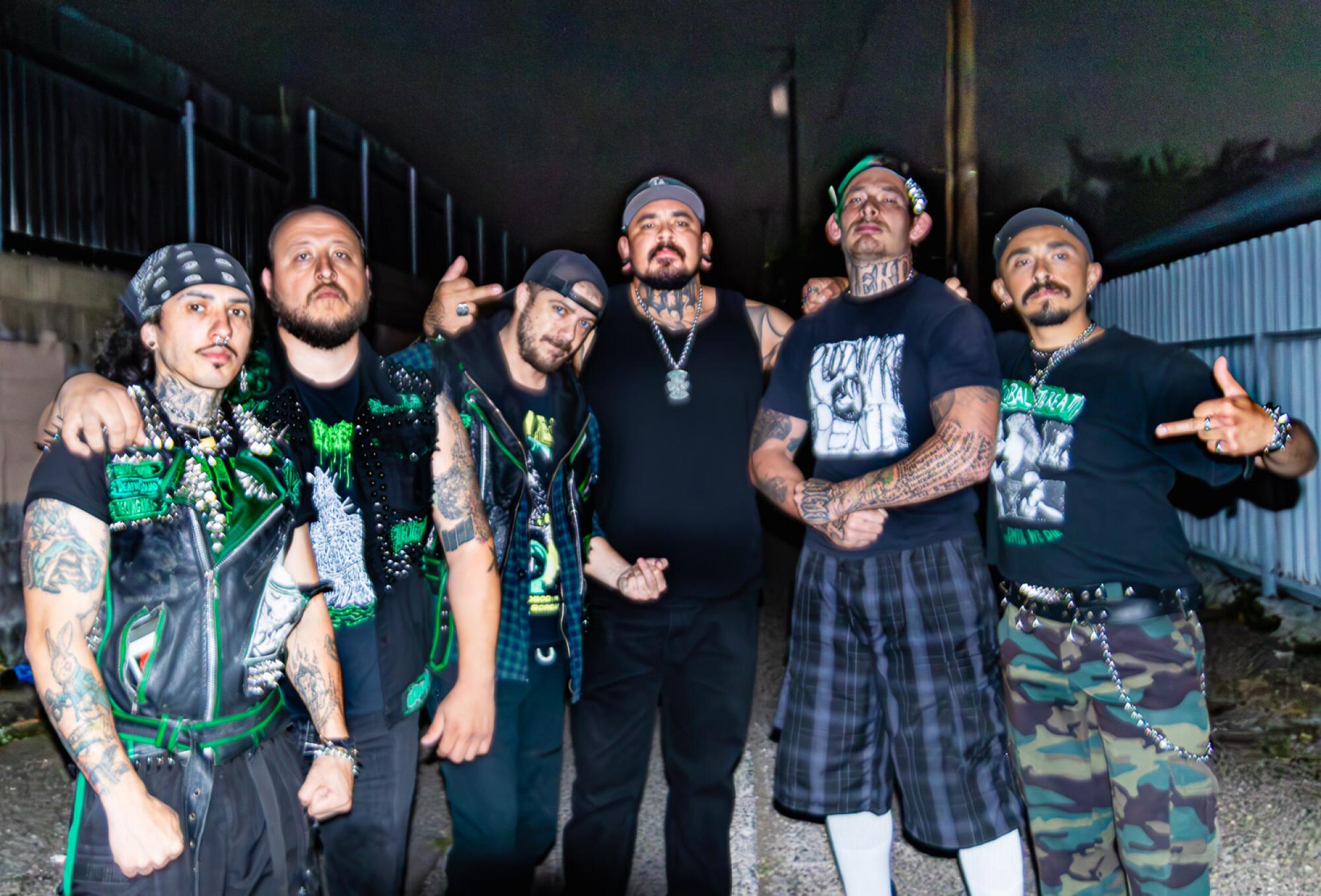
The KnuckleHeadz in Whittier
(Dick Slaughter)
Founded in June 2021 by frontman Thomas Telles of Whittier, better known as Knucklehead Tom, and with the help of guitarist and tattooer Steven Arceo, aka Saus, of El Monte, the Punk Rock Fight Club (PRFC) has grown in a few years to six chapters and more than 200 members across Southern California. What started as a tight circle around a band hardened into a movement: discipline for kids who never got it, structure for men who need it, and a community without substance abuse . Prospects earn their way through mornings, sweat and commitment before they’re trusted with the skull back patch. The rules read like a brick wall and function like a doorway.
“I started the club because I wanted to do good in the scene,” Knucklehead Tom said “I wanted to create a tribe where we all supported each other, a family for people from all walks of life, especially those who came from broken homes. I wanted people to know they have somewhere to go and a family they can count on.”
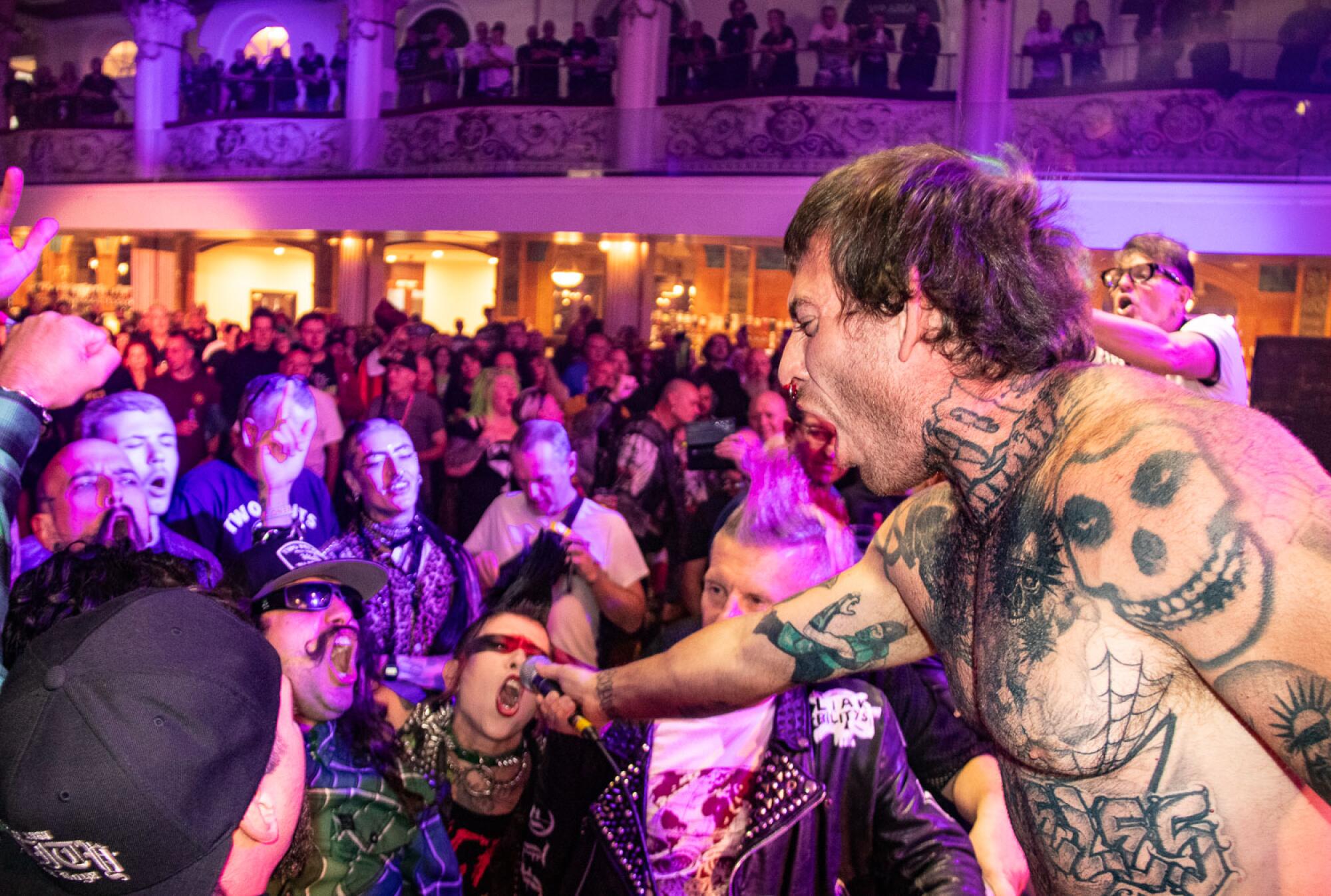
Knucklehead Tom of The KnuckleHeadz puts his mic in to the crowd while performing with the band from Whittier.
(Dick Slaughter)
I first ran into the KnuckleHeadz and a few club members by accident three years ago in a London train station en route to the Rebellion Punk Rock Music Festival in Blackpool, a yearly event featuring more than 300 veteran and emerging bands. They were impossible to miss — part wolf pack, part brotherhood, pure energy. That year the KnuckleHeadz struck a chord with me, not just through their all-in, no-holds-barred performances, but also through their message, their obvious love for one another and their mission to better their community. Since then, I have taken a hard look inside both the band and the club; I visited their gym and attended many of their shows. I have met and talked with families and those the KnuckleHeadz and the club have helped. They have indeed, in many cases, worked miracles. But the guys don’t call them miracles. They call it Tuesday.
“Since we founded Punk Rock Fight Club, we paved way for what we knew was the movement and lifestyle many people in our scene needed,” Arceo said. “We’ve changed so many lives and with that our lives changed as well. We made a family built on brotherhood, loyalty with the camaraderie that can only be achieved through martial arts and punk rock. That’s something many of us grew up without. So to be able to bring this into the world is worth every sacrifice. We’re going on five years strong and will keep going till the day we die.”
The band’s ascent mirrors the spread of the club: a steady climb from underground slots to punk’s biggest stages. They earned a place on the final NOFX show and graduated from Rebellion’s side stage to the festival’s main stage. They’ve organized benefits for causes that don’t trend and for people who can’t afford to be causes. The Punk Rock Museum in Las Vegas recently added a piece of PRFC memorabilia, one of the club’s cuts — a leather vest with the skull back patch — to its collection, a true museum piece that still smells faintly of sweat. Next, KnuckleHeadz prepare for a U.S. run with punk legends GBH, the sort of tour that turns rumor into résumé.
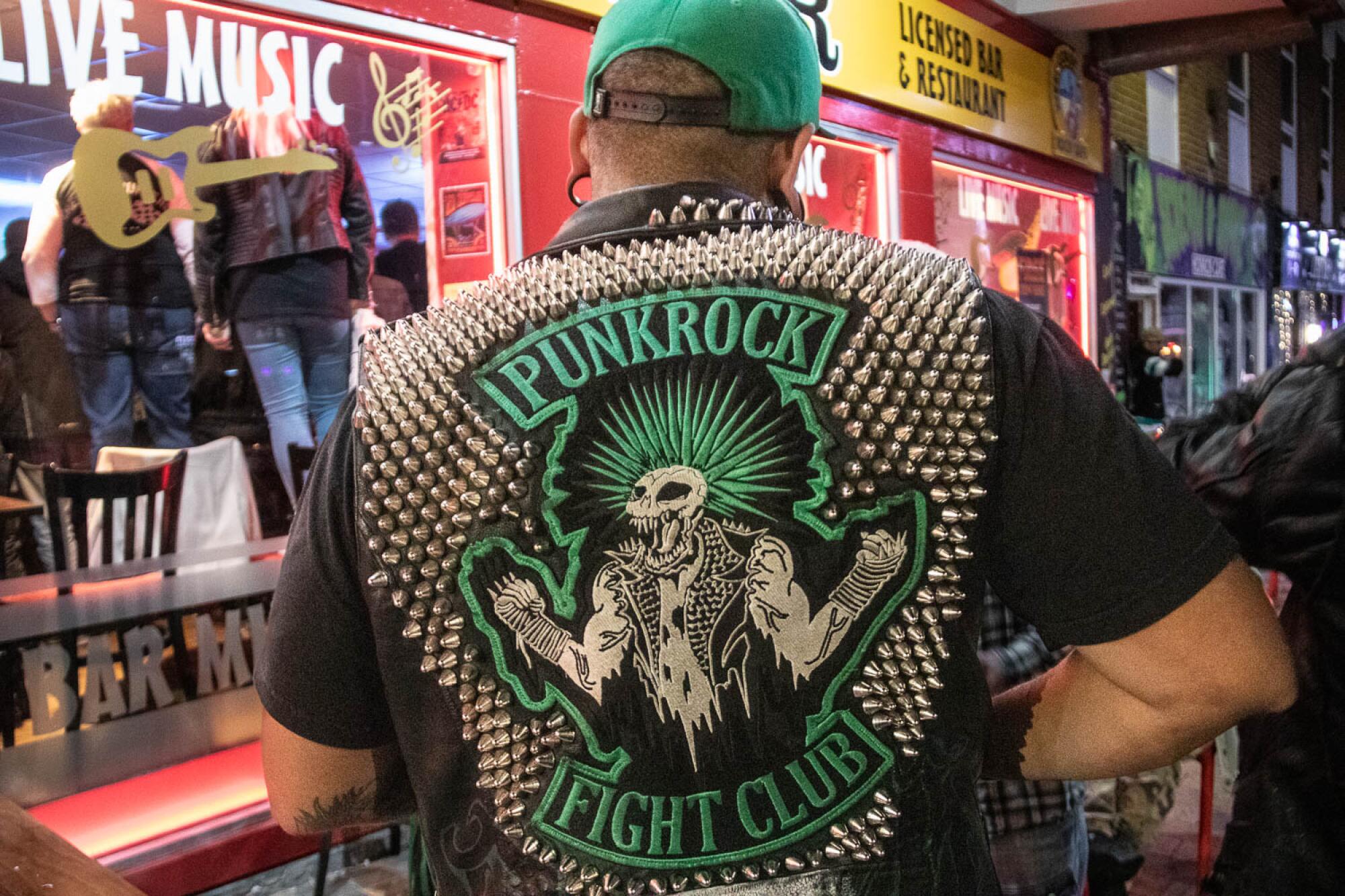
Saus, co-founder of the KnuckleHeadz, wearing the band’s signature vest.
The Whittier dojo, KnuckleHead Martial Arts, is where the KnuckleHeadz code gets practical. It’s where guys run martial arts drills and where the mats serve double duty as community center flooring. During the band’s “F Cancer” benefit for 17-year-old Cesar “Little Cesar” Lopez II, the driveway became an impromptu slam pit. Inside, kids tumbled on the mats while guitars shook the walls. Families brought food, local businesses donated services, and more than $6,000 went toward treatments. In the carnival-like atmosphere outside, Little Cesar grinned and hyped the pit from the sideline, proving that joy, like violence, can be contagious.
One member, Bernard Schindler, 55, of La Mirada, came in after a life of ricochets: rehab, prison, relapse, repeat. The club gave him a schedule first and a future second, and now with the support of the club, he’s been clean and sober for more than two years.
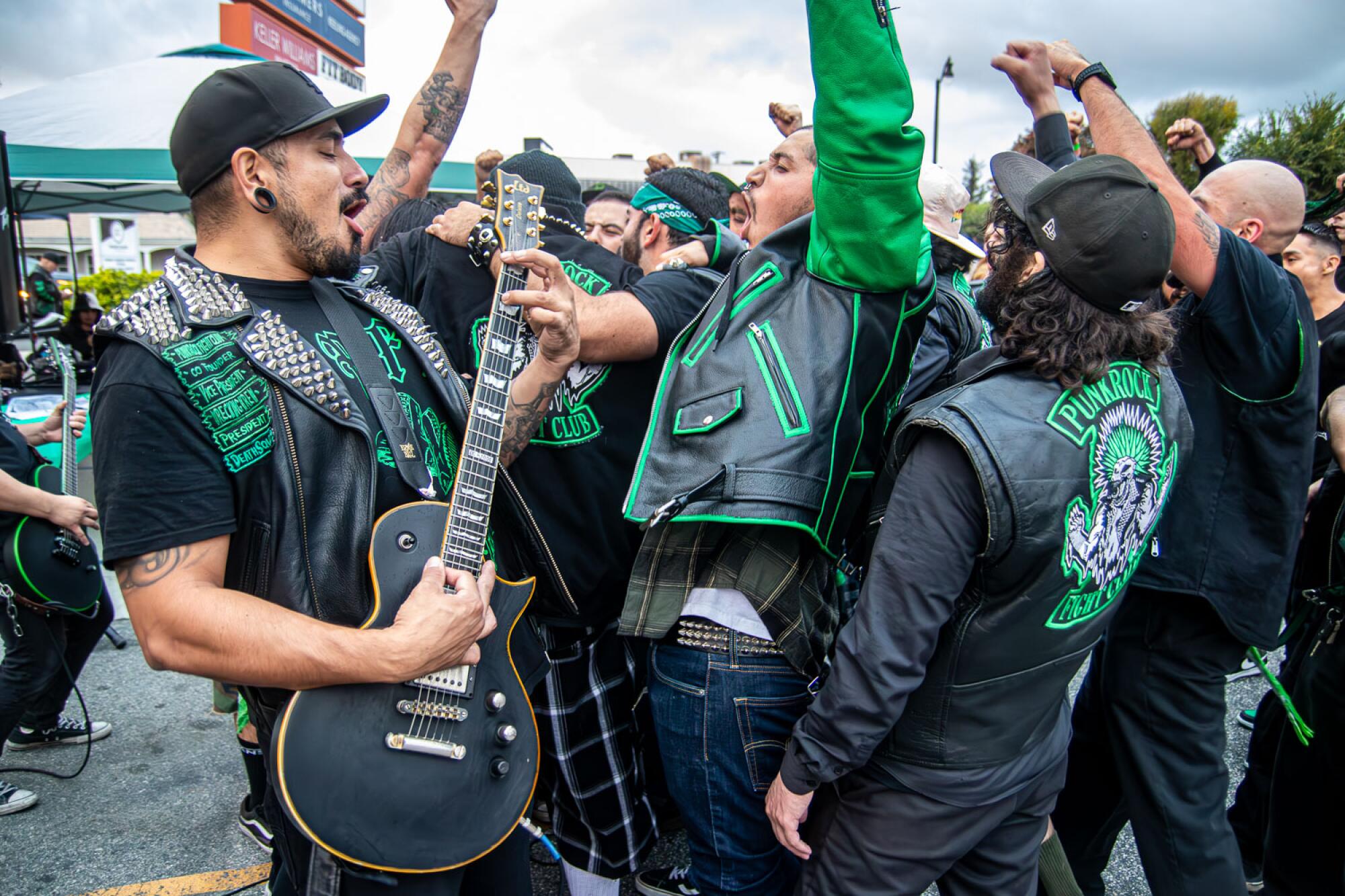
Saus performing with the KnuckleHeadz during a Punk Rock Fight Club benefit show outside the KnuckleHeadz gym in Whittier.
(Dick Slaughter)
“Tom and the Punk Rock Fight Club completely turned my life around,” Schindler said. “It gave me purpose, discipline and a new family of brothers that push me to be better. I went from being a broken down drug addict to the healthiest I’ve ever been mentally, physically and emotionally in the 55 years I’ve been alive.”
Since getting involved with the KnuckleHeadz nearly three years ago, Schindler says he’s gotten closer to his family, including his three sons and his girlfriend, in addition to staying sober. “I can honestly say that I couldn’t have done it without Tom and our God-given club, the Punk Rock Fight Club,” he said.
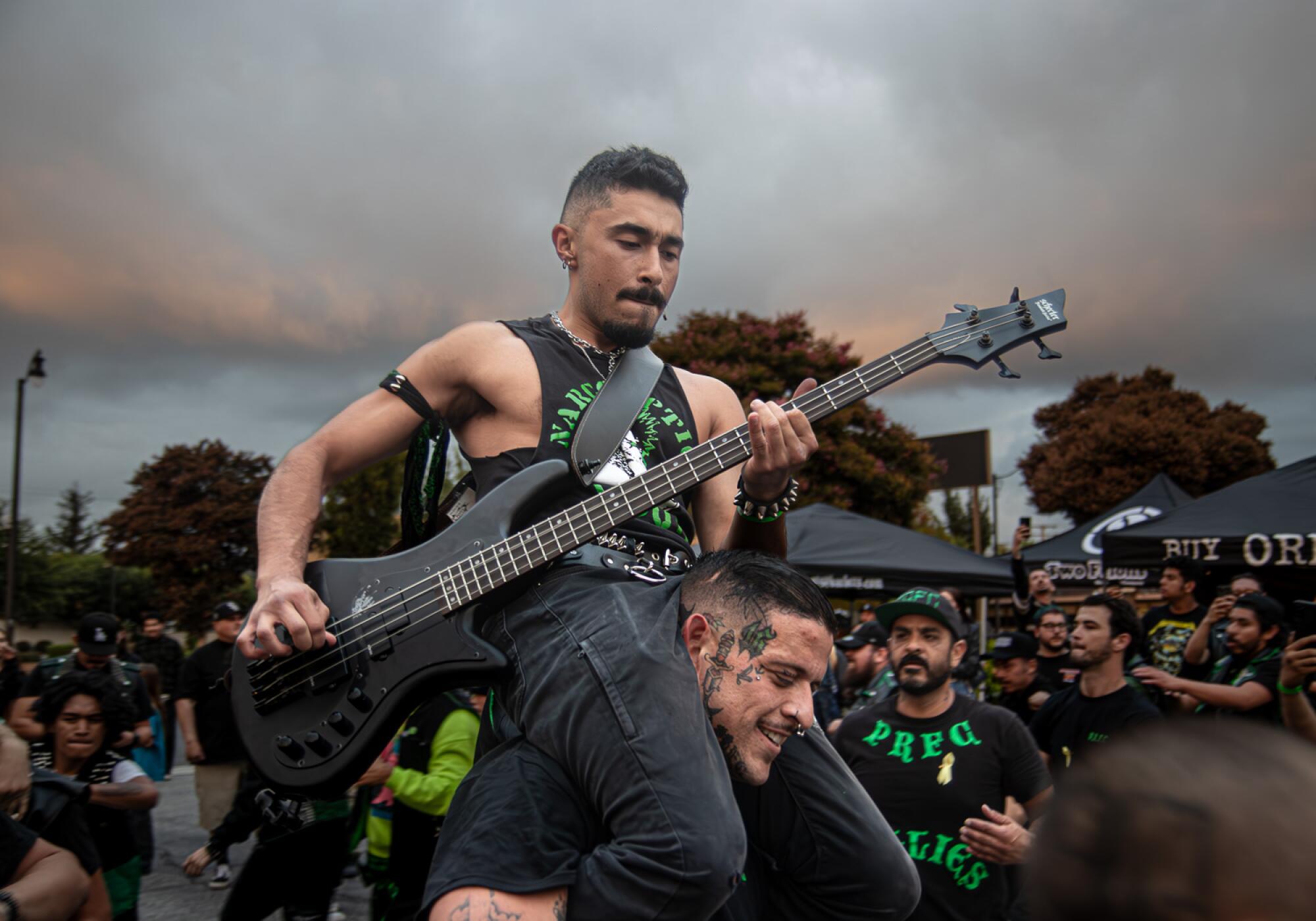
The bassist known as Knucklehead Randy performs while riding on the shoulders of a fellow club member at a benefit show in Whittier.
(Dick Slaughter)
The PRFC trophy case is full of medals and awards, sure, but the real accomplishments are much quieter and miraculous. There are pay stubs where rap sheets used to be, text threads that start with the question “You good?” at 3:17 a.m., and apartment keys handed over when a kid can’t go home.
Hip-hop synth-punk artist N8NOFACE, now a fixture on lineups from the annual L.A. festival Cruel World tours with Limp Bizkit and Corey Feldman, calls Tom “my brother” and credits that code with keeping him aligned. “I was getting clean, and I’ve always believed that if you follow the right people, it helps you stay on your path,” N8 says. “Tom was about health, about not getting all messed up, about being a fighter and a warrior and taking care of your body first. To find that in punk was very different.”
When asked about his hopes for the future of the band, Tom says, “I just want to keep having fun. We love doing it and are grateful for all the love and support.“ The band is currently playing shows across SoCal with gutter punk legends GBH, including a show Friday at the Ventura Music Hall.
“With the club, I want to keep changing lives. It makes me happy to know that my son Nieko has an army of goodhearted uncles if anything were to happen to me. The righteous men in this club make me so proud.”
That’s the trick. That’s the point. In the noise between those truths, a lot of young men hear something they’ve never believed before: a future they’re allowed to keep.
Slaughter is a photographer and writer who has covered music and culture for countless outlets, including the OC Weekly and L.A. Times. He is a founding member of In Spite Magazine.
